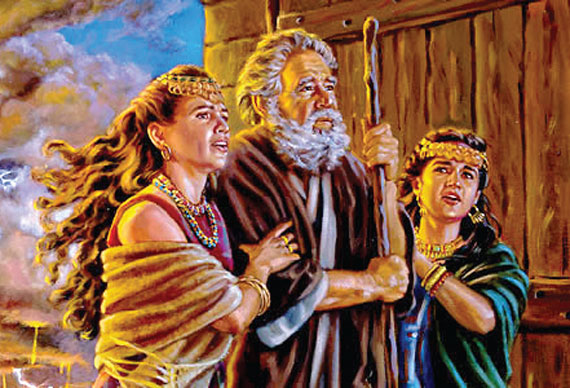Azadi ka Amrit Mahotsav Kolkata event honours four Clergymen
Pope Francis asks businesses to support working women: They’re ‘afraid to get pregnant’
Study: Christianity may lose majority, plurality status in U.S. by 2070
Indian politician declines Magsaysay Award under party pressure
Like John Paul II, Pope Francis heads to Kazakhstan during time of war

Jacob Chanikuzhy
We have a very notorious story of incest (sexual relation between close relatives) in the story of Lot and his two daughters. Though all instances of incest can be painful it is all the more traumatic when a girl is abused by her own father. However, in the biblical story narrated in Genesis 19:31-38 it is the daughters who take initiative to have intercourse with their father. Daughters of Lot intoxicate him to get impregnated from him. The elder daughter named her son Moab which literally means “from my father,” and the younger daughter named her boy “Ben Ammi” meaning “son of my clan” both names indicating the shameful origin of their children and their progeny. The story as such thus serves to degrade the idol worshipping Moabites and Ammonites.
Who was to blame for the sin, Lot or his daughters? As the biblical story unfolds, Lot did not sin knowingly. The daughters were tricking their father. It seems that they knew that their father would not agree with their plan in a sober state. So, their inebriating him itself indicates that he was a man of morals.
However, there are also justification for the act of Lot’s daughters. In fact, Genesis Rabbah (The Jewish homiletical commentary of the Book of Genesis) extolls the intuitive act of these daughters. It is their intuitive incest that provides the messiah with a kingly line. As things turned out, it was Ruth, a Moabite woman, who gave birth to Obed, the grand father of King David. In this sense, their incest was, in the eyes of the rabbinic writer, a “felix culpa,” a “blessed fault.”
At the same time, the Jewish sages do not completely exonerate Lot either. Through a meticulous semantic study of Genesis 19:33 they argue that though Lot did not know what happened when his daughters slept with him, he understood what happened after they left him. That means Lot came to understand that he had sex with his daughters after they left his bed. The question is, if he understood that he had illicit union with his elder daughter in an intoxicated state why Lot drank wine the next day also. His drinking wine the next day indicates that he was willing to have intercourse with his daughter. The Jewish sages go one step further and argue that Lot even desired his daughters for his sexual pleasure. The argument is based on Lot’s living in a cave with his two daughters. The Book of Proverb says, “‘He who separates himself seeks desire’ (Prov. 18:1). According to these sages, the decision of Lot to live in a cave with his daughters, separated from all others, is sufficient to prove that Lot lusted after them. If Lot was afraid of the people of Zoar he could have very well moved to the vicinity of the land of his uncle Abraham. Genesis Rabbah, though frowns upon the action of Lot, nevertheless, forgives him because of the eventual outcome of the act, viz., providing a kingly line for the messiah through a Moabite woman.
Modern interpreters follow suit and indict Lot as an abusive father. They find several similarities between the family of Lot and a typical incestuous family. In a family where the father is abusive of his daughters, the mother is very often a helpless onlooker. So the wife of Lot turning a pillar of salt appears to be a power metaphor of a women who has frozen in her salty tears. Again, once one starts abusing, he continues it with all his children and so did Lot. Most abusers drink before molesting their daughters to overcome their inhibitions and Lot too. Sometimes the abusers brainwash their victims and convince them that there is no one outside to help them. Surprisingly, the daughters of Lot also believed that no men were alive although in all probability there were men in Zoar where they lived for a while. Above all, Lot’s abusive relationship to his daughters can be inferred also from the act of offering his daughters for the sexual pleasures of his townspeople.
If it is true that Lot was an abusive father, how come that the biblical story in its plain sense presents Lot as a victim and his daughters as real villainess? Once again we realize how effectively the bible can portray the human malice and machinations. It presents a powerful and unjust patriarchal culture that effectively protects the abusive patriarch by composing and spreading narratives and stories in which the villain appears as the victim and the victim derided as the villain.
Leave a Comment